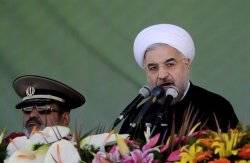Rouhani calls for time-bound nuclear talks
25/09/2013| IslamWeb
The Iranian President, Hassan Rouhani, has offered to find a "framework" to manage differences with the US, saying he was prepared to engage in "time-bound and results-oriented" nuclear talks and did not seek to increase tensions with the United States.
Iran poses "absolutely no threat to the world," Rouhani said at the UN General Assembly on Tuesday hours after the US President, Barack Obama, also expressed an interest in diplomacy to resolve a dispute over Iran's nuclear programme.
Rouhani said he "listened carefully" to a speech earlier in the day by the US president. He said he was hopeful that the two sides could pursue diplomacy, but only if the US government speaks with "a consistent voice".
"[If] they will refrain from following the short-sighted interest of warmongering pressure groups, we can arrive at a framework to manage our differences," Rouhani said.
The Iran's newly elected president also criticized the US and European Union sanctions against his country, comparing them to those imposed on Iraq while the late Saddam Hussein was in power.
"These sanctions are violent, pure and simple," he said, adding that normal people, not political elites, ended up suffering because of them. "The negative impact is not nearly limited to the intended victims of sanctions."
Reaffirming his country's position that its nuclear drive was "exclusively peaceful", Rouhani said that nuclear weapons "have no place in Iran's security and defense doctrine".
Earlier on Tuesday, Obama said that Iran had been a major source of instability for too long, and that he hoped to resolve the nuclear issue peacefully.
"The roadblocks may prove to be too great, but I firmly believe the diplomatic path must be tested," he said, adding that he was charging US Secretary of State John Kerry with pursuing progress on the nuclear issue with Iran, in coordination with five other world powers.
The first test for relations between the US and Iran will come on Thursday, when Kerry and other foreign ministers from the so-called "P5+1" - the permanent members of the Security Council, plus Germany - will meet with Iranian foreign minister Javad Zarif to discuss the nuclear issue.
Obama was set to have "an encounter" with the Iranian president, but Iran said that the meeting was "too complicated for Iranians to do at this point".
The Israeli government quickly dismissed Rouhani's speech, with prime minister Binyamin Netanyahu calling it "cynical." Yuval Steinitz, the intelligence minister, accused Iran of playing a "game of deception."
'Insult to human reason'
Obama also demanded that the world should take action on Syria, reiterating his threat of force against Syrian President Bashar al-Assad's government.
"It is an insult to human reason - and to the legitimacy of this institution - to suggest that anyone other than the regime carried out this attack," he said.
Rouhani, in his speech, welcomed the Syrian government's acceptance of the international treaty to ban chemical weapons, and said "access by extremist terrorist groups to such weapons is the greatest danger to the region".
Speaking in front of the UNGA earlier, UN Secretary-General Ban Ki-moon called on major powers to stop sending weapons to all sides in Syria, as he opened the annual UN General Assembly summit.
The UN chief also called on Assad and the Syrian opposition - and "all those in this hall with influence over them" - to work immediately to arrange a second Geneva conference aimed at reaching a political solution to the crisis that has wracked Syria for more than two years.
"Military victory is an illusion. The only answer is a political settlement," he said.
His appeal comes as the United States and Russia haggle over the language in a UN Security Council resolution meant to seal an agreement for Assad to give up chemical weapons.
Kerry was to meet his Russian counterpart Sergei Lavrov later in the day. Russia is the main supporter of Assad, while the rebels receive support from Western nations and Sunni Arab monarchies.
A top Russian diplomat said that the resolution would include the article of the UN Charter that allows the use of force or sanctions.
PHOTO CAPTION
Iran's President Hassan Rouhani, gives a speech during an annual military parade in Tehran, Iran, Sunday, Sept, 22, 2013.
Aljazeera

